
June 18, 2018; New York Times
Brentwood, New York started out in 1851 as a utopian Long Island community called Modern Times. According to the residents, things are less utopian now. For the 60,000 residents, considered part of the Town of Islip, the hamlet is last on the list for school funding, snow plowing, trash pickup, and local maintenance like repair of streets and traffic lights. Even its parks have been abused, with town officials looking the other way in 2014 when 40,000 tons of contaminated construction debris was dumped among children’s playgrounds.
Residents may disagree on which of the problems that plague Brentwood is worst, but they concur on the cause: there’s no one to speak for their Latinx neighborhood on the predominantly white Islip town board.
“If you come to Brentwood, you would notice that our town looks very different from the other towns in this municipality,” said [resident Maria] Hernandez, 53, who moved to Brentwood from El Salvador nearly 20 years ago. “There’s so much lack of interest from the town board that we feel like an island. We are like a ghost town.”
Two nonprofits, Make the Road New York and New York Communities for Change, are assisting the community with a lawsuit, joining with Hernandez and three other Brentwood residents to change the town’s electoral system. (The Town of Islip has not seen the lawsuit, according to a spokesperson.)
The Town of Islip in Suffolk County covers four incorporated villages and more than 20 unincorporated hamlets. Latinx people make up a third of the town’s population, with most located in Brentwood, North Bay Shore, and Central Islip, but the town board has never had a Latinx representative.
The town representatives are elected by what is commonly called an at-large system—in other words, candidates run town-wide. The lawsuit, filed in federal district court in Brooklyn, seeks to replace this with a district system, which could give Latinx candidates a better chance of being elected from largely Latinx areas.
Sign up for our free newsletters
Subscribe to NPQ's newsletters to have our top stories delivered directly to your inbox.
By signing up, you agree to our privacy policy and terms of use, and to receive messages from NPQ and our partners.
The federal Voting Rights Act of 1965 guides the suit. Similar lawsuits in the 1990s were successful in the nearby Long Island town of Hempstead and in New Rochelle in Westchester County. In another, in Port Chester in 2006, the court found that the at-large system affected the “rights of Hispanics [sic] to participate in the political process.” Quoting from the Islip suit:
[At-large voting] has for many years systematically prevented members of the Town’s minority Latino community from electing any candidates of their choice to the Islip Town Board, thus denying the members of that community their most basic rights. Lacking any representation on the Town Board, members of the Town’s Latino community have been demoted to second-class citizens.
Nonprofits working in Brentwood and the town of Islip can also feel a lack of voice in the local government, from Catholic Charities, to Family Service League, to the Sisters of St. Joseph’s Learning Connection, which teaches Latinas to speak English—not to mention the local school district, which is the largest in the county at 19,052 K-12 students.
Theresa Sanders, president of the Urban League of Long Island, wrote in an email to Nonprofit Quarterly,
When groups of color are not in decision-making positions, their interests are not always represented. For example, which neighborhoods get quality of life issues addressed depends on who is around the table advocating for those communities. It is obvious to see in certain communities that there is no one in position of power advocating, and [the] Town of Islip, like many areas on Long Island, shows obvious disparity in basic neighborhood quality, including well maintained parks and play areas for children, quality grocery stores with fresh fruits and vegetables, and businesses that add to the tax base.
One resident, Ana Flores, a recent graduate of SUNY Stony Brook, feels empowered by the lawsuit—a feeling that is new to her in her town. “I wanted to do something—I wanted to be a part of it,” she said. “I realized that we can do something about the things in our own government that we don’t like. We have a voice.”—Marian Conway












